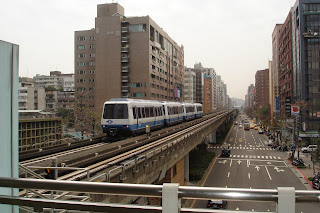Beetlejuice, beetlejuice, beetlejuice!
September 2004
By Diana Leeson
That popular
phrase from the Michael Keaton movie of the same name runs through my head
every time I see a fresh blob of blood-colored betel nut spit on the sidewalk
in Taipei.
Yuck.
Betel nuts, as
they are commonly known, are really areca nuts (the seed of an Indian palm
tree) stuffed with lime paste and wrapped in betel leaves. This combination is
a potent and highly addictive stimulant that is very popular among the trades
people and working classes of Asia. The bundle is tucked into the cheek and
chewed or sucked for hours on end, in the fashion of chewing tobacco.
Most users
describe it as a caffeine-type effect, causing increased alertness. This makes
it extremely popular with taxi and truck drivers who want to be able to work
longer shifts without getting tired. Betel nuts are easily acquired at over
100,000 roadside stands throughout both urban and rural Taiwan.
Perhaps the reason
why it never quite caught on with the middle to upper class members of Asian
society (who prefer to get their caffeine kick from Starbucks and local green
tea) is that it also increases salivation. The flow from the salivary glands
while sucking on betel nuts is quite dramatic and uncontrollable. Users must
keep a spittoon at the ready at all times or, if they are outside, they just
let the spit fall where it may. It also stains the mouth and teeth bright red.
Very attractive.
Taiwan society is
divided on the subject of betel-nut use. Users say it makes you stronger, more
virile, more of a man. (Very few women have been known to take up the habit).
Indeed, the physical effects of the drug include an expansion of the chest and
lungs, a feeling of increased strength and energy.
Some fans of the
stimulant say that it is less addictive than caffeine, without the jittery
nervous feeling. This, unfortunately, has also made it a popular choice among
students who are looking for ways to stay awake during all-night study sessions
while cramming for exams. Campaigns are currently underway to discourage
betel-nut use among teens as it can lead to long-term addiction or the
temptation to move into harder drug use.
In addition,
studies have shown that the process of leeching this strong plant essence
through the mucous membranes of the mouth over a long period of time can lead
to mouth cancer.
Then there’s the
case of the so-called ‘Betel Nut Beauty’. Due to the demands of increased
competition, someone figured out that, if the betel-nut consumer is
predominantly the working class male, then what better way to attract him than
with a scantily clad female? In the last decade, an increasing number of young
women, in their late teens to mid-twenties, started popping up in the roadside
betel-nut stands. They are usually dressed in short skirts, platform heels and
bra tops. In the country areas, some of them wear completely transparent
clothing, thong panties, or just sit there topless. You can imagine the
hazardous effect this sight has on the passing motorist. More than a few
traffic accidents have been caused by this visual distraction.
Although betel
nuts are used throughout Asia, the Betel Nut Beauty is unique to Taiwan. She
has been documented in travel guides and the media and has found a firm place
in modern culture as a tourist attraction. She is also a bit of an
embarrassment to many upstanding members of the Taiwanese community who would
prefer to see much less of her.
In September of
2002, the Deputy Magistrate of Taoyuan County (just outside Taipei) introduced
his “three no’s” policy: no longer could breasts, bellies or buttocks be
exposed by betel-nut girls on the job. Later he relaxed this ruling to allow
midriff-baring outfits.
But the
ever-resourceful Taiwanese betel-nut vendors found a way to get their man
without nudity. They added more fluorescent lighting, bright colors and brand
names like ‘Armani’ to their plexi-glass stalls. Then they dressed their girls
in eye-catching costumes to capture every passing man’s imagination. Now when
you see a Betel Nut Beauty perched high on her stool watching traffic with a
bored expression on her face, she may be dressed as a cat-woman, a sexy nurse,
or in a schoolgirl’s uniform.
I suspect the
traffic accidents will continue.
-30-


















